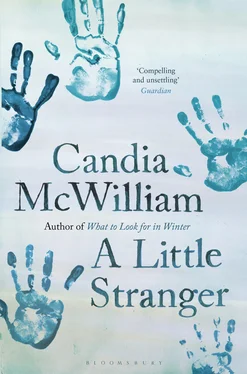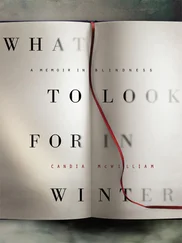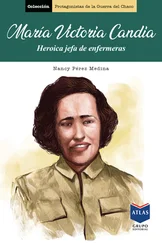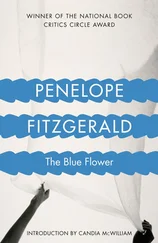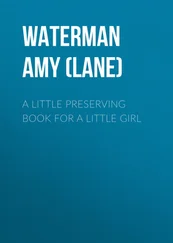Candia McWilliam - A Little Stranger
Здесь есть возможность читать онлайн «Candia McWilliam - A Little Stranger» весь текст электронной книги совершенно бесплатно (целиком полную версию без сокращений). В некоторых случаях можно слушать аудио, скачать через торрент в формате fb2 и присутствует краткое содержание. Год выпуска: 2011, Издательство: Bloomsbury UK, Жанр: Современная проза, на английском языке. Описание произведения, (предисловие) а так же отзывы посетителей доступны на портале библиотеки ЛибКат.
- Название:A Little Stranger
- Автор:
- Издательство:Bloomsbury UK
- Жанр:
- Год:2011
- ISBN:нет данных
- Рейтинг книги:3 / 5. Голосов: 1
-
Избранное:Добавить в избранное
- Отзывы:
-
Ваша оценка:
- 60
- 1
- 2
- 3
- 4
- 5
A Little Stranger: краткое содержание, описание и аннотация
Предлагаем к чтению аннотацию, описание, краткое содержание или предисловие (зависит от того, что написал сам автор книги «A Little Stranger»). Если вы не нашли необходимую информацию о книге — напишите в комментариях, мы постараемся отыскать её.
A Little Stranger — читать онлайн бесплатно полную книгу (весь текст) целиком
Ниже представлен текст книги, разбитый по страницам. Система сохранения места последней прочитанной страницы, позволяет с удобством читать онлайн бесплатно книгу «A Little Stranger», без необходимости каждый раз заново искать на чём Вы остановились. Поставьте закладку, и сможете в любой момент перейти на страницу, на которой закончили чтение.
Интервал:
Закладка:
I turned my dazzling smile upon her, urbi et orbi . I could make all things right.
‘Can I speak for a moment? It must be a moment, as John’s back in ten minutes.’ She counted her time like her calories.
‘Come in; sit down.’ I was delighted. Perhaps she was about to unbend a little.
‘Betty showed me the guinea-pig, but it makes no difference. I’ve told her time and again I won’t have animals. She’s taken it away, of course. But meanwhile we shall not tell John.’
I said nothing. She appeared to take this as mute resistance.
‘I really hate small things,’ she said.
In her energetically made vernal jersey she seemed firmly planted in the room. My verve left me, as though from a sprung leak. As I formed the sentences with which to defy her, I began queasily to feel that it was Bet and I, not she, who had been sneaky. I heard the gulped slam of a car door and the happy officious voice of my son, towards which Margaret — the pearl — turned and walked.
Chapter 12
The pampering spring air and easy days continued through March, and John, who never knew about the pet he almost had, was busy trying out different friends. He had a friend with old knees who had only his parents to care for him at home. I liked this child, though I was afraid of seeing in him virtues our way of life might preclude John from developing. He was a blithe boy, John’s friend Ben, and he had a sensible exploitative attitude to the amenities of our house. Once he arrived with a satchel of mending; to his mother, who was dropping him off, he explained with some tact, ‘I’ve got my work in there,’ the image no doubt of his father.
Now the shooting season was over, the wives living round about were able to have lunch with each other again; the ease of segregation returned. This reversion to a less manned life was part of spring, welcome after the dark, rushed lunches of meat and neat spirits, with the guns talking from both barrels.
Today some of my friends and I were to meet at the house of Leonora, our closest neighbour. She was married to a man who had swarthy skin and blond hair, so he always looked healthy. He was as compact of energy as a battery; he had no languor. His energy seemed wisely invested. You could not mention something he had not done, and show he had done; yet he was modest. He invariably asked the right questions. The parts of his life, I felt, were all of a piece, in spite of their diversity. Yet he seemed to have time to read, and time for his wife.
My friends and their husbands were made for the sun and it sought them out. They were not fashioned for doubt or poverty or disappointment. The women wore gold and blue: golden chains and golden rings; blue and white clothes and blue and white precious stones. They did not paint much, and always smelt sweet. Each of their names ended, feminine to the last, with an ‘a’. At regular times, they went to different and far-flung parts of the blue and white and golden known world. The khaki areas of desert and armies were unvisited.
Like that china which, though unmatching, may be arranged together, always prettily — the blue bridges, blue pagodas, faint cerulean follies, pale azure branchlets, blowsy ultramarine galleons, all on differently white grounds — these girls (women was too biological a term) went happily together, and each also had other sets to which she belonged, all similar of aspect, yet each member individual. They did not displace time with worry or regret. They shared religion; they shared a masseuse. The same wall-eyed Cypriot sold them all heavy cold sheets hoared with lace.
I describe a chorus; yet each had her own tone. They were accomplished, even virtuoso, in some things, but, tactful, they did not overdevelop any trait. Their feet were narrow; their children beautiful. What they told was the truth. They wore flowers in summer, furs in winter. They were tough, too, beneath the freshness and softness. There was nowhere, no hinge or crack, for a blade to slip in. High-fired good china, perfect as an egg, and enclosing good, rich life.
Each had her nanny.
The eating part of lunch was swiftly over and we drank water. I took my lead from my friends, who never paid much attention to food for themselves, though they made sure their husbands had the best. We sat about Leonora’s dining-room table. The door of the hexagonal room was a little ajar and through it came the singing yells of children. The nannies’ voices did not carry.
‘Close the door, Antonia, would you? Just a short break from the monkey-house, I think, don’t you?’ Leonora was pouring coffee into cups the colours of different fondants. In her place I might have worried about shutting out a fatal accident.
The room was full of that dazzling spring sunshine which makes you unreasonably pleased. A faint smell of warm cloth exuded from the green silk walls, mixing with the smells of coffee and blossom. A large bowl of viburnum filled the fireplace with lace.
‘At least we’ve got zookeepers,’ said Antonia. She had five children, all of them light-hearted and intelligent and devoted to their mother, who now chocked her square face abruptly into her left hand, and waved her right, hailing a light for her cigarette. The ashtrays were like flat silver sombreros. Looking around at my slender, unpregnant friends, I felt as though I were barded with a suit of fat.
Victoria stretched in front of me, with a flaming knuckle, and the smell of smoke threaded among us. As she reached, her fringe caught and tossed away the sun. She had a sandy face with dark eyes and thin hands and legs like a boy, or the sort of fashion model who is chosen for her physical embodiment of intelligence; her voice was thorny. To drive, she wore glasses, whose rims were the peat-red of her hair.
‘What if they turn out to be real horrors?’ she asked. ‘I mean liars, or cruel.’
‘I wouldn’t have it,’ replied Leonora.
‘No choice,’ hooted Julia over the table, picking up a pebble of sugar and nipping it between her front teeth.
‘Who’re we talking about?’ Clara was rifling in her basket and when she lifted her head her hair rocked back into place, smooth as a ball. Her eyes were sad at their outer edge, set into her head like two almonds of blue paisley. They were outlined with black. She began to sew, the looping movements of the needles less restful than the formal quietus of smoking.
‘Who d’you think, Clara?’
‘What do we always talk about?’
‘Children.’
‘Try again. I mean, would the little angels ever lie or be unkind?’
‘I meant nannies,’ said Leonora.
‘I meant children,’ said Victoria, ‘but now we’re on nannies let’s stay there. It’s not as though they weren’t discussing us. I wonder whose husband is being turned into sausages right now.’
‘Something rather more solid, I bet,’ said Clara.
‘Dawn tells me they snaffle the blue videos the men watch after shooting teas, and look at them after bath-time.’
‘She never told you herself?’
‘Not totally. Freddie saw a bit of one when he went down to her with a bad dream. He said she was looking at a telly programme about schoolteachers and naughty boys and I took it from there. Any luck it’ll put him off and he can look after his poor old ma in her latter years.’
‘D’you remember that one who said she was the Red Hand of God? Some muddle there?’
‘The holy rolling one with the sacred-text soap?’
‘The very one.’
‘And the homesick one with the telephone calls to Ballachulish.’
‘I like those ones. It’s the ones with men in the bed and moans of pleasure who make me feel tired.’
‘What about the one who was addicted to ringing ambulances? Had to go in the end when Viv fractured his skull and they wouldn’t come out here. She’d a thing about the uniform.’
Читать дальшеИнтервал:
Закладка:
Похожие книги на «A Little Stranger»
Представляем Вашему вниманию похожие книги на «A Little Stranger» списком для выбора. Мы отобрали схожую по названию и смыслу литературу в надежде предоставить читателям больше вариантов отыскать новые, интересные, ещё непрочитанные произведения.
Обсуждение, отзывы о книге «A Little Stranger» и просто собственные мнения читателей. Оставьте ваши комментарии, напишите, что Вы думаете о произведении, его смысле или главных героях. Укажите что конкретно понравилось, а что нет, и почему Вы так считаете.
